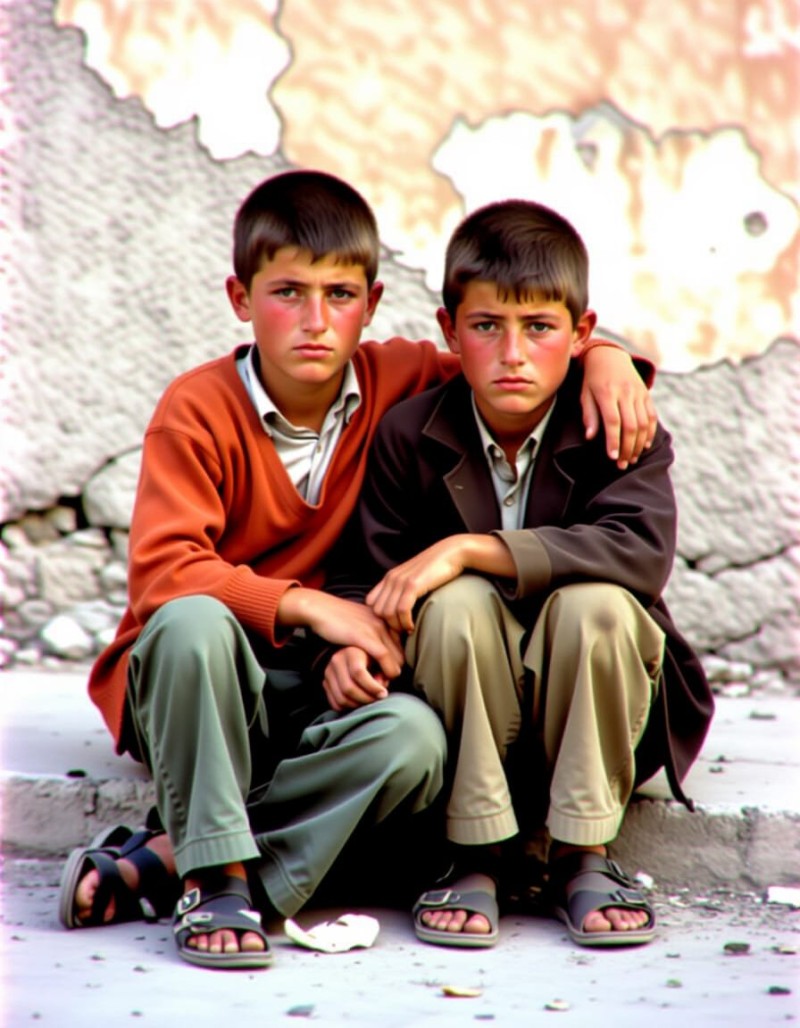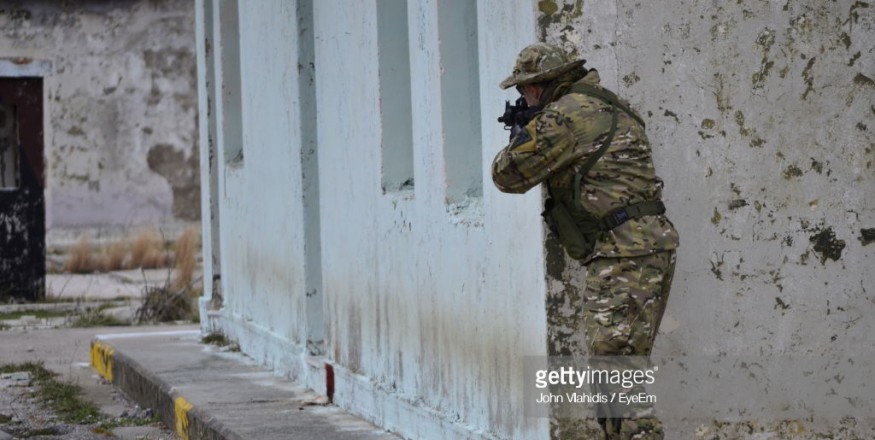 x
x
Dragan and Luka had grown up more like brothers than friends—neighbors by chance, family by necessity. They had spent so many years side by side that they didn’t need words anymore. By now, they could read each other’s thoughts as easily as reading road signs painted on the side of crumbling walls. Dragan couldn’t remember a time when Luka hadn’t been within reach—splashing barefoot through rain puddles, chasing chickens through vegetable plots, stabbing at each other with crooked sticks they imagined were swords or spears. They’d played školice, that old game passed down from their grandfathers, using flattened bottle caps, bent nails, and broken bits of tile to mark the squares scratched into the dirt beside the smokehouse. When one of them lost a piece, they'd just scavenge another from the junk heap behind the blacksmith’s shed. When they were very small, they’d given each other nicknames—though no one remembered why anymore. Miloš, somehow, became “Dragan.” Vlado turned into “Luka.” It stuck, and that was that. The village barely called them by anything else. As soon as they were old enough to lift a basket or swing a hoe, they’d been sent to school—two years, maybe three. Long enough to learn to read signs, write their names, and memorize the national anthem. Then the war crept closer, and the teachers left, and the men vanished—drafted, disappeared, buried without graves. After that, school was done. The boys were needed in the barley fields, or at the olive press, or down at the river docks, where they helped load sacks of grain, jars of pickled vegetables, and crates of dried figs onto trucks bound for the next village or barges floating down the gray-green river. Their hands blistered early. Their backs learned the weight of labor before their voices had even deepened. By the time they were nine, they could communicate across the square or across a warehouse with nothing but a twitch of the mouth or the shift of an eyebrow. A raised left eyebrow meant watch out. A raised right eyebrow meant it’s safe. They used the left one so often both of them had developed a permanent upward tilt—half warning, half habit. Now, at twelve, they sometimes forgot which of them had said or done something. Who had thrown the rock at the checkpoint sign? Who had stolen the heel of bread from the foreman’s crate? It didn’t matter. They were a single unit. Two boys surviving on borrowed time.
Dragan didn’t need to look at Luka to know exactly what he was thinking now. Three guards on us. At least a dozen more in a ring around the square. Most of them look worn down—boots scuffed, shoulders sagging. One has a limp. Another’s arm is wrapped in a field dressing. They're tired. Hungry. They didn’t come this far into the hills unless they were desperate. They’re short on men. They’ve come to fill their trucks again. They came before and took the older boys. This time, they take us.
Dragan turned just a fraction, careful not to draw attention, and glanced at his cousin Ksar. Ksar stood to his left, still as stone, tall as a grown man despite being barely fifteen. His frame was lean, almost wiry, but his shoulders had started to curve forward from too many months lifting sacks of flour and hauling crates of pickled vegetables at the river docks. His hands were always rough and cracked from handling burlap and splintered wood. Even now, under the soldier’s grip, he didn’t look angry.
But Dragan knew better. Ksar had been expecting this day for a long time. Everyone had. It was considered a small miracle—wild luck, the old women said—that he had managed to avoid the soldiers every time they came. Always out in the hills delivering food, or helping repair the irrigation ditch near the old Roman bridge, or walking grain to a cousin’s farm on the other side of the valley. Somehow, he had always been gone when the trucks rolled in.
Until now.
In some ways, Dragan thought, it was worse for Ksar than for him or Luka. Much worse. Ksar was the last one. The only child left in his family. His mother—Dragan’s mother’s older sister—had once been the schoolteacher, back when the school still had windows and books and a chalkboard that wasn’t cracked down the middle. His father had been the village doctor, respected and always tired, a man who smelled like soap and boiled cloth. Two years ago, they were both arrested. Since then, Ksar had lived with his grandparents in a crumbling red-brick house near the edge of the village, not far from the abandoned tannery. The roof leaked in spring, and the windows were sealed with layers of old cloth to keep out the winter wind. But somehow, despite everything, Ksar had more education than most boys his age. His mother had taught him to read early, and he had never stopped. Even after the school closed and the teachers vanished, he read anything he could find—scraps of newspapers, old textbooks, worn paperbacks left behind by foreign aid workers or passed quietly from house to house.707Please respect copyright.PENANAqsjQmIxy9k
He was always asking questions, too. He spoke with anyone who knew something about the outside world—truck drivers who came down from the capital, old men who remembered life before the fighting, or women who had relatives abroad. He asked about border crossings, about the price of train tickets, about what was true and what was only broadcast on state radio. People thought he was wasting his time, or worse, drawing attention. But Ksar didn’t seem to care. He even talked about trying to reach the capital, to search for his parents—though everyone knew this was pointless. Dangerous, even. There was no help to be found in the capital. Just ministries with locked doors, streets filled with checkpoints, and too many windows with curtains that never moved. The idea that a fifteen-year-old boy could walk into a government building and ask for information was almost laughable. But Ksar still said it. Not often, and not loudly, but enough that Dragan knew he meant it.707Please respect copyright.PENANA8zzWxz0ZFG
Mr. and Mrs. Vučković had been arrested by the VSB—Vojna Sigurnosna Brigada, the Military Security Brigade. Everyone knew the name. It was whispered more than spoken. The VSB had accused them of “spreading enemy propaganda and undermining national morale.” That was the phrase. It was printed on a slip of paper given to Ksar’s grandmother the day after they were taken. Nothing more. No trial, no hearing. Not even a date. No one ever returned from a VSB arrest. That was just understood. No letters ever arrived. No information ever came back. Most people didn’t even bother asking. It was a kind of national ritual—pretend they might still be alive for the sake of the children, but everyone knew better. The truth was buried across the countryside. Literally. Unmarked graves were everywhere—beside roads, behind factories, in ditches near train stations. Farmers had learned to expect bones when they plowed new fields. A child’s shoe, a jawbone, sometimes a full ribcage curled like a question mark beneath the soil. No one reported it. No one wanted to dig too deep. It was understood, though never openly said, that this was how those “arrested” had been “tried.” Ksar never admitted that his parents were dead. Not once. Not even to Dragan. He never spoke about it unless forced. But Dragan knew. You could see it in his cousin’s eyes—the way they never lingered too long on the past, and the way he never asked the same question twice. Ksar wasn’t hoping anymore. He was just waiting for the next blow to land.
707Please respect copyright.PENANA1WPURQ4QKB






















